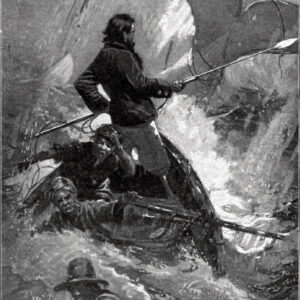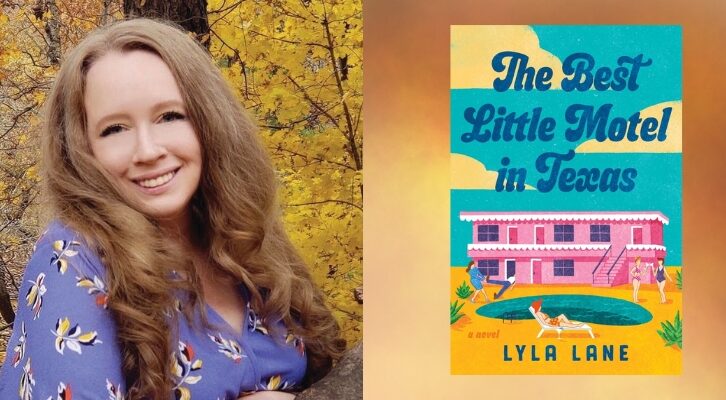
On Letting Kids Be Kids at Summer Camp
From Elizabeth Bishop to the Poets of Tomorrow
Camp II is the hardest. The week comes halfway through the camp season when our counselors’ reserves are at their lowest. They have been on the mountain, down the road from Sewanee, for several weeks, and the end of the season remains too far away for their hopes to buoy their attitudes and energies. But perhaps I’m burying the lede and not giving our counselors enough credit—Camp II is actually the most difficult of the weeks, which are grouped by ages, because the middle schoolers come. Rising seventh- through rising ninth-graders drag their baggage—with too many clothes, too much drama, and dummy cellphones to hand over for the week—from the bus and settle into their Eno hammocks hung from cabin rafters only to show each other that they, too, have an Eno hammock.
I’ve served as co-director of a 90-year-old Episcopal youth summer camp in the Cumberland Mountains of Tennessee for the past two years, and it’s at this point in the summer when I sit down with our college-age counselors at the morning staff meeting in the dining hall—to the tune of still-asleep middle school boys inhaling Cheerios and downing straight-from-concentrate, sugar-filled, individually sealed orange juice cups in the background—and read them an untitled Robert Lax poem from Circus Days and Nights:
In a
world of men condemned to earn their
bread by the sweat of their brows, the
liberty of those who,
like lilies of the field, live by
playing. For playing is like Wisdom before
the face of the Lord. Their play is
praise. Their praise is prayer. This
play, like the ritual gestures of the
priest, is characterized by grace;
Heavenly grace unfolding, flowering
and reflected in the physical grace
of the player.
As if on cue, a camper spills a half-gallon of milk at the table beside us, and the room erupts in rubber necks and laughter. I remind the counselors who sigh and walk to clean it up that Lax was on to something.
Playing at summer camp these days is different from the antics of campers depicted in the camp literature and films of yesteryear. One colleague from back home in Nashville—I’m a boys’ school teacher and coach in my non-summer months—texts me memes from Meatballs on occasion during the summer. I remind him in this generation of the overprotected child that campers are too frightened to run away (and there is nothing close to public transportation to catch in Grundy County, Tennessee); there are no hotdog-eating contests (a choking hazard, and even some elementary school campers’ parents have taught them that pork is not healthy); and during the dance on the final night, my counselors sarcastically (but it works) make sure that campers leave room for the Holy Spirit.
Similarly gone are the somewhat dangerous pranks depicted by Andrew Hudgins (coincidently now living a few miles away in Sewanee) in “At Camp”:
Late Sunday night when my roommate’s bare foot
awakened the green snake I’d hid in his bed,
he screamed, and I howled back a maniac’s howl,
the shriek of a demon freed from my head.
The pranks these days are limited to water balloons (not in the face, and watch for the kids with latex allergies), shaving cream, and glitter hidden in shampoo bottles. Still, the snakes remain outside of pranks. Last summer, I received a call from one of our counselors shortly after midnight and a subsequent voicemail recording when I failed to wake. A few text messages a short while later did the trick, and I listened to the recording that described the counselor’s stumbling upon a copperhead with a frog in its mouth near a well-traveled walkway for the campers. When I didn’t answer the phone, he, along with another former Boy Scout, fashioned a pocket knife to the end of a PVC pipe and tried to kill the snake. Needless to say, they weren’t successful, and the snake soon left with its dinner but remained in the staff’s imaginations until all of the campers left that year.
During this year’s week of staff training before the camp sessions begin, I asked the counselors, all of whom are former campers, what they believed to be the purpose, or mission, of our Episcopal youth camp. “To lead campers closer to God,” one counselor said. Another replied, “to let them see God in nature.” And then one counselor said, “Camp should be an escape for them. The mission of camp is to allow them to be who they really are.” I had never thought about summer camp serving this purpose—I grew up going to Boy Scout camp instead of church camp (and Boy Scout camp was often what I wanted to escape) and had a rather ideal childhood with nothing to escape. Hudgins writes in that same poem, “You’ll slide into sleep to the singing of crickets, / untroubled by mowers or Mom’s drunken sobbing.” It turns out that this counselor’s remark, unbeknownst to me, was even in some of our marketing materials: “designed to help kids… to be themselves.”
The counselor’s comment made me think about an essay published in VQR a few years ago about Elizabeth Bishop’s summer camp experience during her teenage years. William Logan writes that Bishop attended a “sailing camp on Cape Cod… where she found respite from the families engaged in a tug-of-war over her upbringing (it would be too much to say her affections), her father’s in Worcester, Massachusetts, and her mother’s in Revere and farther away in Great Village, Nova Scotia.” Many of our campers tell us that they have felt as Bishop did when she was 14: “I have never been homesick but just at present I feel awfly campsick,” she writes after returning home that year. At our first camp session this year, the one for the littlest campers who come with a parent overnight for only a few days, many cried when it was time to leave because “it ended too fast.” They didn’t want to return home. While these little ones could not yet articulate that camp was an escape, or that being themselves was what they found here, I believe that these reasons still formed their experiences.
Bishop wrote a friend in 1926, “I have given up caring what people think about me—at home anyway. That’s what I like about camp. They rather expect me to do queer things and everyone is so nice to me.” We, too, expect our campers to be weird. (What type of kid today looks forward to church camp each summer?) In fact, we hope they’re weird, and it’s the weird ones we recall fondly throughout the year. Jolly Ranchers are always the way to calm one returning camper who does not manage stress well; a lack of bathing despite capable shower facilities plagues both girls and boys each year; and one of campers’ favorite games each year involves a tambourine and dancing in a circle. Last year, a young boy, early middle school age, asked a female counselor to apply makeup on his face before the week-ending talent show (our “Coffee House”). The camp staff was a bit worried about how the other kids would react, but we let him be him. He performed an interpretive dance in full makeup and costume (again, from a female counselor’s trunk) to an electronic orchestral piece of music he had on his iPod. He received a standing ovation and was a hero for the last day of camp. Sadly, he was a one-year-only kid, a rarity at this camp. I’ll reserve writing that we’re lesser for his absence in the hope that we see another camper celebrated for being himself or herself this year.
Hudgins begins the last stanza of his camp poem, “The demon is me and I’m starting to like him.” Though we’re an outdoorsy church camp, we can see the beauty in Hudgins’ demon, this evolution of a camper’s becoming himself in only the short week we have him. Hudgins continues:
He answers the night with a shriek from my bowl,
a howl for the moon, fresh meat and hot blood—
howling for howling, the best kind of howl.
Howling for the sake of howling is summer camp in all its glory. This camp’s director in the 1960s, an Episcopal priest, wrote an article for a church magazine back then in defense of summer camp. He writes that camp is an end in itself: “Let us be done with the heresy of pragmatism which is always nervously asking, ‘Of what use is it to this cause or that?’ It is not given to us to use the camp to control or predict results beyond the camping experience.”
When we try to obtain our own outcomes for the campers by the end of a week, or when we allow parents’ expectations to influence too much of their children’s experiences, we fail our campers and ourselves by missing the beauty that John Rodriguez depicts in “At Best”:
I was Holden
Caulfield, summer camp senior counselor for the junior trail
blazers, black and brown children two weeks shy of first, second,
and third grade. Nothing is as positive, as motivating a force within
one’s life as a school bus full of kids singing along to the local
radio station blazing hip-hop and R&B. (Imagine this cherubic
chorus riding upstate to Ini Kamoze’s “Here Comes the Hotstepper.”
[“Muuur-derah!”]) My workday is filled with hazards like chocolate
melted sticky swim trunk pockets, insistent sunburn, and the assorted
rah rah of parental unsupervision, but those bus rides back from
upstate water parks and pools were my favorite times working.
Here’s my “at best” experience from last summer: It’s Camp II, and 50 middle schoolers sit cross-legged on a dusty, dirty floor of what I can best describe as a “nicer shack.” The decrepit building is part of the library from the Highlander Folk School in which Martin Luther King, Jr. and Rosa Parks taught workshops on non-violent desegregation strategies. (A billboard on a nearby highway previously depicted King inside the building with the words “Martin Luther King at Communist Training School.”) We had just finished a two-mile walking pilgrimage to the building from our summer camp, past more than one Confederate Flag and growling dog. Pete Seeger taught “We Shall Overcome” inside these walls, and we listened to a recording of Seeger’s singing the anthem from a 1963 Carnegie Hall show. We then sang it ourselves.
“I guess I can struggle along until camp time next year—its my one refuge,” Bishop writes as a teenager. Perhaps camp is a refuge for more than the campers.
Win Bassett
Win Bassett’s essays and interviews have been published by The Atlantic, Oxford American, The Paris Review Daily, and The Poetry Foundation. A former assistant district attorney, he teaches and coaches at a boys’ school in Nashville, Tennessee.



















